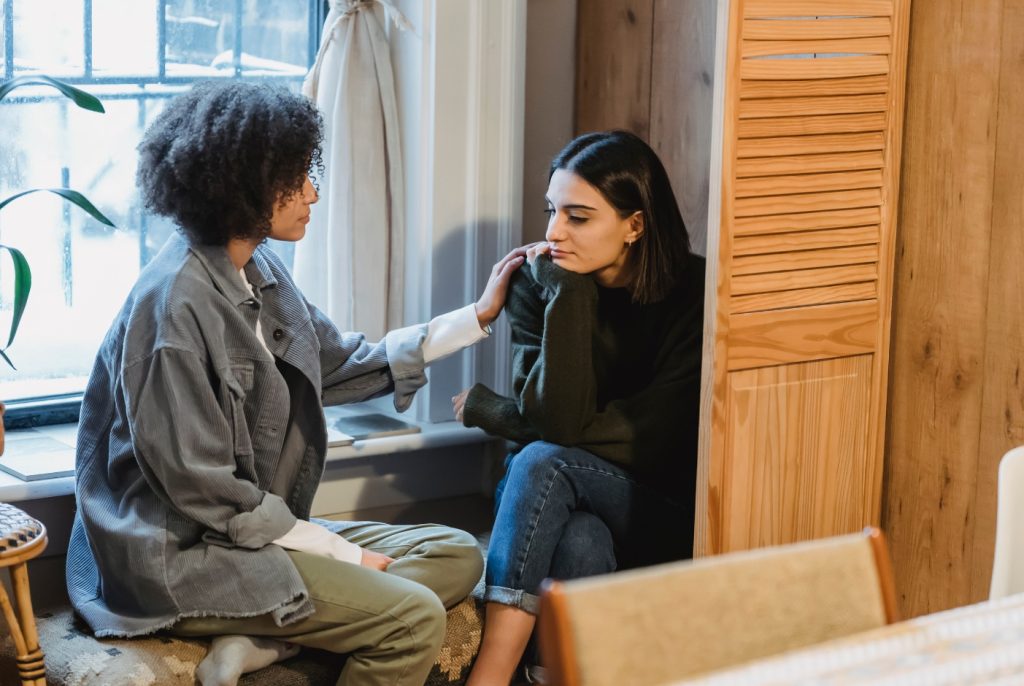How to Support a Friend with BDD
BDD can be difficult for family, friends and partners. It can be upsetting, confusing or infuriating that the person you care about persists in seeing themselves as ugly no matter what you tell them. We hope the information on this page will help guide you.
Please Note we have another page dedicated to the Parents of Young People with BDD
Some BDD behaviours can seem odd to an observer, but they are just a part of BDD. BDD is a disorder, not ‘madness’ and is not ‘bad’ behaviour done to annoy you. BDD is not something that can be easily stopped. It will take time, commitment, and guidance to improve their quality of life. Each person’s recovery journey will be unique to them and will need to be at their own pace. Patience during the tough times is valuable. Try to stay optimistic about their recovery and assure them you are there to support them each step of the way.
I’m worried about my friend, what can I do?
If you think your friend might have BDD, and you are worried about them, there are a few options for you to consider. Try and remember that your friend is likely to be seeing themselves very differently to how others see them, so accepting they may have BDD might not happen straight away. Also remember that it is not solely your responsibility to help them get better, and you alone will struggle to help them without professional help. However, a supportive friend can help by:

- Supporting the person to identify the problem. This might involve gently letting them know that you’ve noticed a change in their behaviour, or that they are very distressed by their appearance. Let them know you are raising it with them because you care and want them to get better. Try and have a supportive conversation to see how they are feeling and how this is impacting them.
- Encourage and support them to seek professional help. BDD is unlikely to go away on it’s own, and so accessing professional treatment is really important to help someone get better. See what they might feel comfortable with and how you can support them. This might start with speaking to a teacher, their GP, a parent or a school/ college counsellor. Speaking to a trusted professional about their struggles is a good place to start in accessing appropriate support and treatment.
- With their consent, explore whether there’s anyone you could tell on their behalf. E.G. A parent or teacher. It can be really difficult for people with BDD to open up to others about it. If they want you to, you could help them seek support by starting the conversation for them, or just letting someone know you are worried about them. You could also help them think about how they might tell someone if they’d prefer to do this alone.
- Try and educate yourself to understand the condition better. If you are reading this page then that’s a great place to start. We have lots of resources on our website and books by clinicians which can help you learn more. Reading about other people stories of BDD is also useful and it shows your friend that you really care and want to understand what they are going through.
- Show them some of the stories and journeys of recovery on this website. People who haven’t yet had treatment for their BDD often feel very nervous about what this involves, and the road ahead can feel scary and uncertain. Knowing that recovery is possible can offer them hope and courage to take that next step into treatment.
- Avoid (where possible) reassuring your friend about their appearance. We know this can feel tricky, as it’s likely that the concern they have is unnoticeable to others, and it can feel confusing that it’s causing them so much distress. However, we know that offering someone reassurance about their appearance doesn’t stop their worrying and can sometimes make it worse. If they ask for reassurance about their image, try one of these responses:

‘I know you are feeling really worried about your appearance, but I have noticed that reassuring you about appearance isn’t helping you, and I want to help you.’
‘I know your appearance is really upsetting you, but let’s try and focus on where you can find support to help with these feelings.’
‘I really want you to get better, and I don’t think me commenting on your appearance is helping so I have decided not to comment today.’
‘ I want you to keep sharing with me so I can support you, but I am going to try not giving you reassurance about your appearance in case it’s making things worse.’
- Make sure you are looking after yourself. Seeing someone you care about go through BDD is really tough, and it can sometimes feel exhausting trying to help them. Keep doing the things you enjoy, lean on your support networks to discuss how it’s impacting you, and speak to a trusted adult if it’s feeling like too much.
- Remember that BDD recovery can take a long time, so try not to put any expectations on them or expect them to be better as soon as they start their treatment. Check in to see how it’s going but remember that it’s a difficult process and must go at their own pace.
- Finally, be a cheerleader and encourage them to persist with treatment once they are accessing some. Let them know how proud you are of the steps they are taking and keep offering enthusiasm, empathy and encouragement throughout. People with BDD can recover and get better, so there is a light at the end of the tunnel. Once they are starting to feel a bit better, offer to organise to spend some time together doing something they enjoy.
